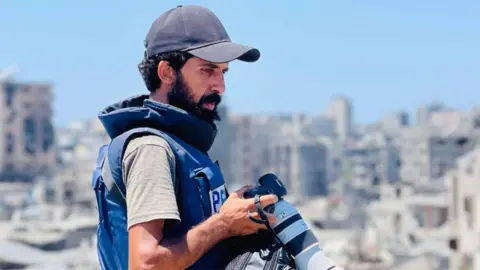 BBC
BBCFb has severely restricted the flexibility of Palestinian information shops to achieve an viewers throughout the Israel-Gaza struggle, in line with BBC analysis.
In a complete evaluation of Fb knowledge, we discovered that newsrooms within the Palestinian territories – in Gaza and the West Financial institution – had suffered a steep drop in viewers engagement since October 2023.
The BBC has additionally seen leaked paperwork exhibiting that Instagram – one other Meta-owned platform – elevated its moderation of Palestinian consumer feedback after October 2023.
Meta – the proprietor of Fb – says that any implication that it intentionally suppressed explicit voices is “unequivocally false”.
For the reason that starting of the Israel-Gaza struggle, just some outdoors reporters have been allowed to enter the Palestinian coastal territory of Gaza from the skin, they usually have been solely ready to take action escorted by the Israeli military.
Social media has stuffed the hole for these wanting to listen to extra voices from inside Gaza. Fb pages for information shops equivalent to Palestine TV, Wafa information company and Palestinian Al-Watan Information – which function out of the West Financial institution territory – grew to become a significant supply of updates for a lot of around the globe.
BBC Information Arabic compiled engagement knowledge on the Fb pages of 20 distinguished Palestinian-based information organisations within the 12 months main as much as the 7 October Hamas assaults on Israel, and within the 12 months since.
Engagement is a key measure of how a lot affect a social media account is having and the way many individuals are seeing its content material. It contains such elements because the variety of feedback, reactions and shares.
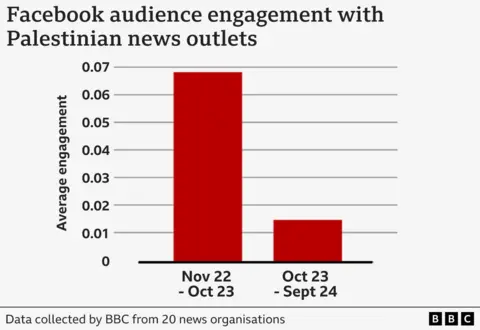
Throughout a interval of struggle, viewers engagement may be anticipated to rise. Nevertheless, the info confirmed a 77% decline after the Hamas assaults on 7 October 2023.
Palestine TV has 5.8 million followers on Fb. Journalists on the newsroom shared statistics with us exhibiting a 60% drop within the variety of individuals seeing their posts.
“Interplay was utterly restricted, and our posts stopped reaching individuals,” says Tariq Ziad, a journalist on the channel.
Over the previous 12 months, Palestinian journalists have raised fears that their on-line content material is being “shadow-banned” by Meta – in different phrases, restricted in how many individuals see it.
To check this, we carried out the identical knowledge evaluation on the Fb pages of 20 Israeli information organisations equivalent to Yediot Ahronot, Israel Hayom and Channel 13. These pages additionally posted a considerable amount of war-related content material, however their viewers engagement elevated by practically 37%.
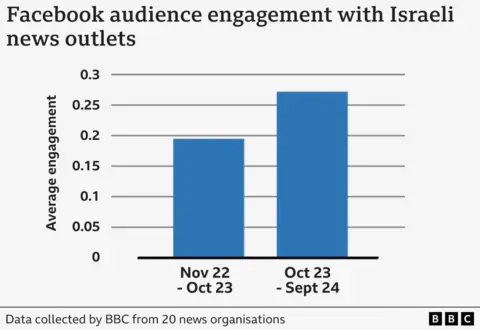
Meta has beforehand been accused by Palestinians and human rights teams of failing to reasonable on-line exercise pretty.
An unbiased report in 2021 commissioned by the corporate mentioned this was not deliberate however due to a scarcity of Arabic-speaking experience amongst moderators. Phrases and phrases have been being interpreted as offensive or violent, once they have been the truth is innocuous.
For instance, the Arabic phrase “Alhamdulillah”, which suggests “Reward be to God”, was generally being auto-translated as “Reward be to God, Palestinian terrorists are combating for his or her freedom”.
To see if this defined the decline in engagement with Palestinian shops, the BBC carried out the identical evaluation on Fb pages for 30 distinguished Arabic-language information sources primarily based elsewhere, equivalent to Sky Information Arabia and Al-Jazeera.
Nevertheless, these pages noticed a median improve in engagement of practically 100%.
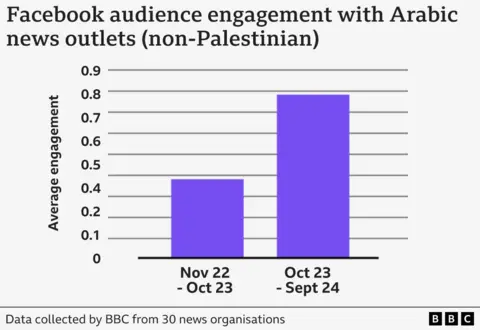
Responding to our analysis, Meta identified that it had made no secret of “momentary product and coverage measures” taken in October 2023.
It mentioned it had confronted a problem balancing the suitable to freedom of speech, with the truth that Hamas was each US-sanctioned and designated as a harmful organisation beneath Meta’s personal insurance policies.
The tech large additionally mentioned that pages posting solely concerning the struggle have been extra prone to see engagement impacted.
“We acknowledge we make errors, however any implication that we intentionally suppress a selected voice is unequivocally false,” a spokesperson mentioned.
Leaked Instagram paperwork
The BBC has additionally spoken to 5 former and present staff of Meta concerning the affect they are saying their firm’s insurance policies have had on particular person Palestinian customers.
One particular person, who spoke anonymously, shared leaked inner paperwork a couple of change made to Instagram’s algorithm, which toughened the moderation of Palestinians commenting on Instagram posts.
“Inside every week of the Hamas assault, the code was modified basically making it extra aggressive in the direction of Palestinian individuals,” he mentioned.
Inside messages present that an engineer raised issues concerning the order, frightened that it might be “introducing a brand new bias into the system towards Palestinian customers”.
Meta confirmed it took the measure however mentioned it had been essential to answer what it known as a “spike in hateful content material” popping out of the Palestinian territories.
It mentioned that coverage modifications put in place in the beginning of the Israel-Gaza struggle had now been reversed, however didn’t say when this occurred.
At the very least 137 Palestinian journalists are reported to have been killed in Gaza for the reason that starting of the battle, however a number of keep it up regardless of the hazards.
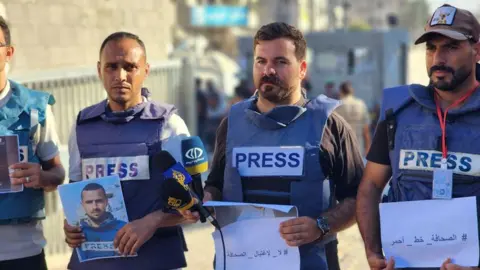 Getty Pictures
Getty Pictures“Plenty of info cannot be revealed as it’s too graphic – for instance if the [Israeli] military commits a bloodbath and we movie it, the video will not unfold,” says Omar el Qataa, one of many few photojournalists who selected to remain in northern Gaza.
“However despite the challenges, the dangers, and the content material bans,” he says,”we should proceed sharing Palestinian content material.”
Extra reporting by Rehab Ismail and Natalie Merzougui




